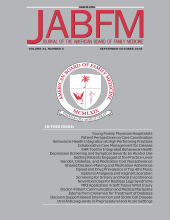To the Editor:
As a physician who was trained and is licensed in the United States and is also licensed in El Salvador and has practiced in mission medicine in rural El Salvador for 20 years, I enjoyed Dr. Ventres's1 perspective on primary care in Central America. I concur with that author's observation that El Salvador does a fine job of providing community-level primary health care. Community health care promoters are providing outstanding care related to universal vaccinations, prenatal health care, environmental interventions for outbreaks of dengue fever, and hospital referrals for emergencies. Being personally acquainted with some of these promoters, I also see the unfortunate side of the efforts to improve health care outcomes: these promoters, themselves generally from impoverished communities, are frequently threatened and sometimes penalized for negative outcomes beyond their control. These rural promoters perceive themselves as being virtually voiceless and powerless in a system where the lowest tier of workforce may be easily replaced by others eager for work.
However, for the many impoverished people who will die of acute and chronic disease if they are only vaccinated and given prenatal care, El Salvador is providing inadequate health care. Our clinic is barraged with patients who left the (free) public health care system because there is no metformin available for diabetes, who continue suffering from a wheezy cough despite having (inappropriately) received amoxicillin, and whose cancers are misdiagnosed and undertreated until treatment is no longer an option. Dr. Ventres teaches in San Salvador; I understand why he doesn't experience this daily aspect of the grave limitations of the health care system. At the time when El Salvador's care of acute/chronic diseases matches the wisdom and thoroughness of their prevention of diseases, we will have a model for the world.
References
- 1.↵







